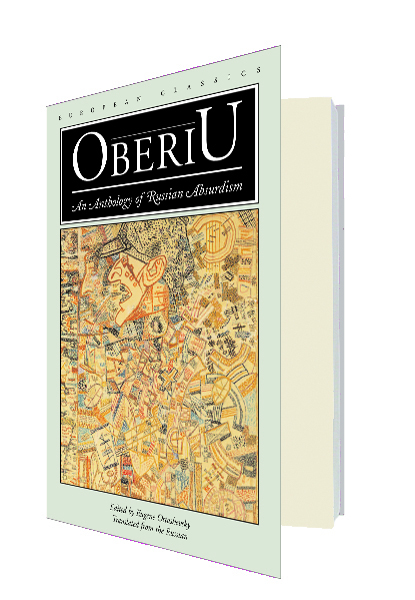“Oberiu” was a group of early Soviet–era avant-garde writers whose absurdist innovations made them hugely controversial in their time and landed many of them in prison. Now, Oberiu: An Anthology of Russian Absurdism brings together six writers (Alexander Vvedensky, Daniil Kharms, Nikolai Zabolotsky, Nikolai Oleinikov, Leonid Lipavsky, and Yakov Druskin) frequently associated with this period, and their narrative experiments and bleakly violent comedy make them read almost like our contemporaries.
To Americans, the most familiar Oberiu member is probably Daniil Kharms. Kharms—whose real name was Daniil Yuvachev, and who died of starvation in a lunatic asylum—is the funniest and nastiest Oberiu writer. In the story “Thing,” a monk who “clambered out from under the floorboards” attacks a family, punching a father in the ear and hitting the mother, “either with his hand, or with his foot, it was hard to tell,” before disappearing back into the house. The father returns to quotidian, drunken bleakness, while the mother continues haranguing him. In “An American Story,” a guard at a slaughterhouse falls and breaks his arm when an intruder devours a cow, and decorates himself with the remains. No one in the work of Daniil Kharms is a “comrade”—his characters feel no sense of kinship at all—and the selflessness and goodwill so essential to the Socialist project is pointedly absent. Kharms’s Russia is cruelty’s utopia, which explains why the Soviets found his work to be intolerable, and why they had him institutionalized.
Other Oberiu voices may be less fatalistic than Kharms’s, but they still treat the individual mind as a battleground. In the poem “The Battle of Elephants,” Nikolai Zabalotsky writes that “The horses of adjectives trample / the faltering figures of nouns” and “The war elephants of the subconscious / Crawl out and shuffle / Like giant dwarfs.” But if misery, to paraphrase Wallace Stevens, must be imagined, it can be de-imagined also, which is why Nikolai Oleinikov writes that “Love dissipates and passion lies. / Yet there it is, beyond reproach, / the marvelous structure of the cockroach. / O energetic cockroachy legs…They’re saying something, they’re scribbling on air.” The wonderful Oleinikov loves insects, no doubt because they are forsaken and grotesque.“I was madly in love with a fly,” he seems to sing in “The Fly.” “My glittering, many-legged girlfriend. / She flew in circles above me / She knocked and she beat on the glass.” In a world deprived of meaning, Oleinikov reinvents the world with almost Buddhist sentiment: “Be quick, melancholics!” he writes in “Zeros.” “Hurry, depressives! / Rub a zero and all will be well!” “Death,” a long piece by Yakov Druskin, militates against the finality of its subject through relentless metamorphoses, beginning as a story, and disappearing into single lines, as if losing interest in the reader and wanting only to mutter to itself. “After several difficult postwar years,” Druskin writes, “life became light and empty like that of mayflies.” He perpetually wields this combination of bleakness, consolation, and enigma. “What do I care whether I am foolish or wise,” he writes, “if there is no happiness.”
It seems incredible that literature this quietly inquisitive and surreal could be dangerous, but it comes from a time when privacy had been abolished, when irony itself was a kind of dissent, because the state had seized control of the language. Even if for these reasons alone, the work of Oberiu is as relevant to our moment as it was when it was written.





